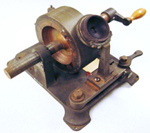
Edison made a start on the history of sound recording by recording a piece “mary had a little lamb” with his own voice on phonograph in 12 August 1877. In 1895, sound recording tools came to Istanbul where is one of the most proper cities in the World in order to make sound recording and market them. |
 |
 |
SIGMUND WEINBERG was the first person who brought the phonograph to Istanbul.
Somehow, the phonograph was mentioned with cinema in those years. As a result of admiration felt for EDISON invented these new gadgets, French Pathe firm had dense activities in both areas and also dealt with cinema. Sigmund Weinberg, representative of them, was also the first person to organize cinema show in Istanbul. |
On September 26, 1887, Emil Berliner made the invention registered with name of "GRAMOPHONE" 10 years later after Edison had obtained the patent of phonograph.
The first gramophone of Berliner was situated on a rotating disc and worked by scouring lateral tracks on records tarnished with lampblack.
Gramophone records had a superior advantage than phonograph cylinders: Thanks to the motion from one main mold, it was possible to produce records in infinite number. Records performed in early periods in Turkey became products by being pressed in factories in Germany and England, were conveyed via ships and sold as imported goods. This means that mold of these early period records left abroad. Whereas especially the first ten year records were high in number and also important in terms of repertory.
The fact that two world wars destroyed many documents of collection and especially archives of factories in Germany were completely cleared away was upsetting in terms of our recording history.
Moreover, the fact that companies were not used to store product samples, molds and miscellaneous document and material after coming into operation in their factories in Feriköy and Yeşilköy also prevented an important cultural heritage to reach today.
FIRST TURKISH RECORDS
Turkish society striving in westernization and innovation were interested in this tool. Firms understood that it would be a good market for Istanbul with various ethnic mosaics and the first recording group came in Istanbul in 1900. Technicians of The Gramophone Company performed approximately 170 recordings.
* We have no idea about how many of these recordings entered to the market in 1903.
* The company of Emil Berliner also made approximately 3000 recordings from 1900 to 1912.
* First records were pressed as one-sided.
* There was an increase in number of female artists after the year of 1906.
PERIOD OF HAMDI
Sultan Abdulhamit II ascended to throne in 1876. The Sultan bidding a promising future ended the constitutional period by closing the parliament he had already opened with his own efforts. Sense of authoritarianism called as Istibdat (despotism) caused Ottoman society to become introverted.
From 1904 to 1910, especially women contented themselves with listening to sound coming from the gramophone and exhibited a hard line attitude on using their sounds for recording.
Coming of musicians before the funnel realized with difficulties because this device was considered as "Affair of Giaour" or "unholy".
RECORD EXPERIENCED THE GOLDEN AGE IN 1930s
The concepts born with proclamation of the Republic like innovation, westernization, modernization etc compelled Turkish society to break its inflexible traditional structure. Appearing on stage or vocalizing a piece or canto having been considered as peculiar to Armenian, Greek and Gypsy women was able to be performed by Turkish women easily.
Fikriye Hanim was the first Turkish woman to make a record with her sound and was the prima donna of operetta of Sureyya which was also bringing an end to reign of Armenian operetta. Hafiz Sami, Hafiz Osman, Hafiz Aşir, and Tamburi Cemil Bey maintained their reputation in period of Empire with an increasing interest.
|